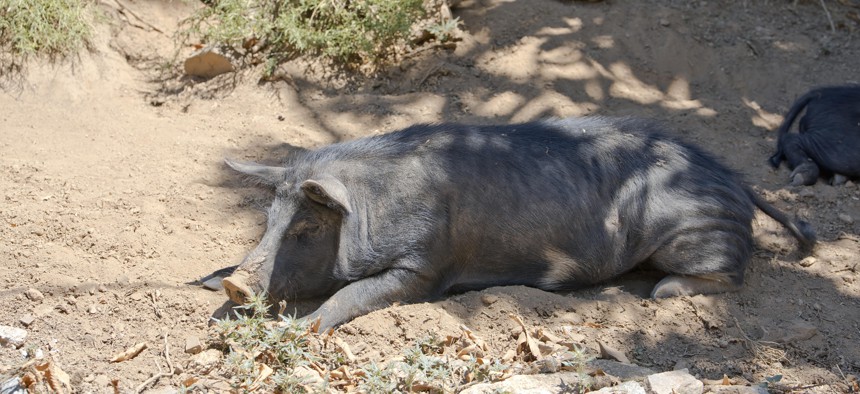One State Lawmaker's Plan to Ramp Up the Battle Against Wild Hogs

GettyImages/ imageBROKER/Christian Zappel
California, like other states, is trying to manage the invasive animals, which cause billions in damage each year nationwide. A state senator wants to make it easier for people to hunt them.
Feral pigs have been damaging California lawns, crops, waterways and harming other wildlife as the state's population of the invasive swine continues to grow, as The Los Angeles Times recently reported. The animals are causing big headaches for government managers, farmers, homeowners and others.
To help combat the problem, state Sen. Bill Dodd recently introduced a bill that would make it easier for hunters and others to go after the pigs. The bill specifies that the wild pig is not a game or nongame mammal, allowing residents to kill it if it’s causing destruction. The bill also decreases the fee for each pig killed from $25 per pig to a $15 annual permit, allowing residents to hunt as many wild pigs as they want. If passed, the provisions become effective July 1, 2023.
In Alabama, hunters can purchase a license to hunt feral pigs at night, a measure approved by state legislators as an added population control method for the destructive, nonnative species. A bill signed into law last year legalizes nighttime hunting for coyotes and feral hogs, though the law focuses mostly on the swine.
“They eat crops. They’ll root up a golf course,” Marianne Hudson, a conservation outreach specialist with the Alabama Wildlife and Freshwater Fisheries Division, told Route Fifty last summer. “And then there’s the loss of the resources that our native wildlife depends on.”
A National Problem
California isn't the only state having problems with the invasive animal, feral hogs have been seen in at least 35 states and have an estimated population of more than 6 million.
The wild animal doesn't just cause property damage, it can also pose risks for the environment and human health. Wild hogs harm native species by taking food and habitat away from them, and their habit of swimming in water causes erosion of river, stream and pond banks.
Meanwhile, their poop poses an additional threat, experts say. The large animal—adults range from 150 to 500 pounds—spread more than 30 infectious diseases, 20 of which can be transmitted to humans.
Federal officials say the pigs cause roughly $1.5 billion to $2.5 billion worth of damage to agriculture and property across the country every year and even refer to them as the “most destructive” invasive species in the nation. They are a "dangerous, destructive and invasive species," according to the Department of Agriculture.
Andre Claudio is an assistant editor at Route Fifty.
NEXT STORY: State Officials Resist Supreme Court Ruling Affirming Tribal Authority Over American Indian Country





